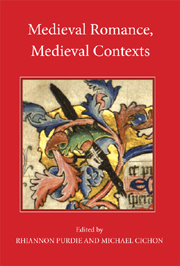Book contents
- Frontmatter
- Contents
- Acknowledgements
- Contributors
- Abbreviations
- Introduction: Romance and its Medieval Contexts
- 1 The Pleasure of Popular Romance: A Prefatory Essay
- 2 Representations of Peasant Speech: Some Literary and Social Contexts for The Taill of Rauf Coilyear
- 3 ‘As ye have brewd, so shal ye drink’: the Proverbial Context of Eger and Grime
- 4 Ekphrasis and Narrative in Emaré and Sir Eglamour of Artois
- 5 What's in a Name? Anglo-Norman Romances or Chansons de geste?
- 6 ‘For Goddes loue, sir, mercy!’: Recontextualising the Modern Critical Text of Floris and Blancheflor
- 7 Roland in England: Contextualising the Middle English Song of Roland
- 8 Romance Baptisms and Theological Contexts in The King of Tars and Sir Ferumbras
- 9 Modern and Medieval Views on Swooning: the Literary and Medical Contexts of Fainting in Romance
- 10 Walking (between) the Lines: Romance as Itinerary/Map
- 11 Romances of Continuity in the English Rous Roll
- 12 ‘Ex Libris domini duncani / Campbell de glenwrquhay/ miles’: The Buik of King Alexander the Conquerour in the household of Sir Duncan Campbell, seventh laird of Glenorchy
- 13 ‘Pur les francs homes amender’: Clerical Authors and the Thirteenth-Century Context of Historical Romance
- Index
- Volumes already published
2 - Representations of Peasant Speech: Some Literary and Social Contexts for The Taill of Rauf Coilyear
Published online by Cambridge University Press: 12 September 2012
- Frontmatter
- Contents
- Acknowledgements
- Contributors
- Abbreviations
- Introduction: Romance and its Medieval Contexts
- 1 The Pleasure of Popular Romance: A Prefatory Essay
- 2 Representations of Peasant Speech: Some Literary and Social Contexts for The Taill of Rauf Coilyear
- 3 ‘As ye have brewd, so shal ye drink’: the Proverbial Context of Eger and Grime
- 4 Ekphrasis and Narrative in Emaré and Sir Eglamour of Artois
- 5 What's in a Name? Anglo-Norman Romances or Chansons de geste?
- 6 ‘For Goddes loue, sir, mercy!’: Recontextualising the Modern Critical Text of Floris and Blancheflor
- 7 Roland in England: Contextualising the Middle English Song of Roland
- 8 Romance Baptisms and Theological Contexts in The King of Tars and Sir Ferumbras
- 9 Modern and Medieval Views on Swooning: the Literary and Medical Contexts of Fainting in Romance
- 10 Walking (between) the Lines: Romance as Itinerary/Map
- 11 Romances of Continuity in the English Rous Roll
- 12 ‘Ex Libris domini duncani / Campbell de glenwrquhay/ miles’: The Buik of King Alexander the Conquerour in the household of Sir Duncan Campbell, seventh laird of Glenorchy
- 13 ‘Pur les francs homes amender’: Clerical Authors and the Thirteenth-Century Context of Historical Romance
- Index
- Volumes already published
Summary
This essay offers some fresh contexts for reading The Taill of Rauf Coilyear, one of many late medieval narratives that sit uneasily, and therefore intriguingly, within the generic category ‘medieval romance’. Preserved in a printed edition of 1572, the tale is nevertheless ‘medieval’: its composition is generally dated to the later fifteenth century, and scholars regularly extend the boundary of medieval Scots poetry well into the sixteenth. Rauf Coilyear's claims to the designation ‘romance’ include the appearance of the cyclical romance hero Charlemagne among its characters, the adaptation of an alliterative stanza form shared by a subset of English romances, and the extreme elasticity of the romance category itself. The existing scholarship examines The Taill of Rauf Coilyear within a variety of contexts, including Scottish romances, alliterative romances, Charlemagne romances, romances depicting Saracens, and encounters with unrecognised kings. I hope to expand Rauf's frame of reference in two ways: first, by comparing the main character's peasant identity and his use of language to that of the peasant speaker in the Middle English prose Dialogue of Solomon and Marcolf (c.1492) and, second, by attending to two subgenres embedded within Rauf Coilyear, the proverb and the popular complaint or ‘poem of social protest’. These contexts for The Taill of Rauf Coilyear help us to see more clearly what is at stake in its representation of a speaking voice only rarely heard in the realm of romance.
- Type
- Chapter
- Information
- Medieval Romance, Medieval Contexts , pp. 19 - 34Publisher: Boydell & BrewerPrint publication year: 2011



